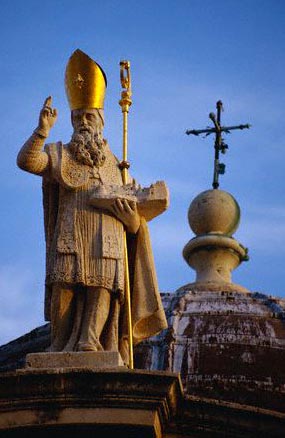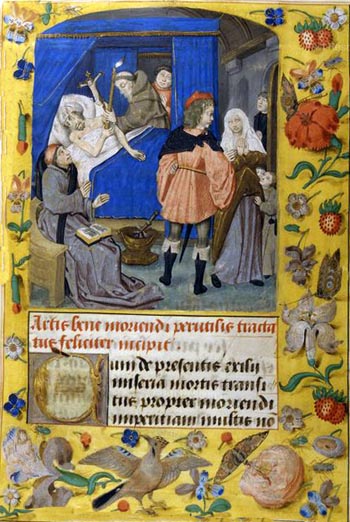 |
The Saint of the Day
St. Blaise - February 3
Prof. Plinio Corrêa de Oliveira
Biographical selection:
St. Blaise was the Bishop of Sebastea in Armenia who was martyred under the reign of Licinius in the early fourth century.
Many Catholics remember St. Blaise's feast day because of the Blessing of the Throats that takes place on this day. Two candles are blessed, held slightly open, and pressed against the throat by the priest as he says the blessing. St. Blaise's protection of those with throat troubles comes from his healing of a boy who had a fishbone stuck in his throat. The boy was about to die when St. Blaise healed him.
Comments of Prof. Plinio:
You know that the blessed candle is a sacramental, that is, once it is blessed, it becomes an instrument of grace for those who use it. It is an old tradition of the Church, for example, that a dying person should hold a candle in his hand during his last moments. If he were unable to hold the candle by himself, some member of his family should help him to hold it until his last breath.

St Blaise, patron of Dubrovnik, Croatia, stands alongside its cathedral
|
There is a tradition among the faithful, based on some private revelations, that when the chastisement predicted in Fatima comes, there will be three days of complete darkness in which the Devil will have full power. According to this tradition, the faithful who will be fighting for the Reign of Mary must have blessed candles in their homes and light them, not just to benefit from the light but also to keep away the Devil and his temptations. So, there are many places in Europe and the Americas where persons keep blessed candles to light and keep with them during that time.
I have a blessed candle for this purpose in my home. My thinking is quite simple: I am not concerned about investigating whether the original revelation is true or false. To have a blessed candle is a good thing; therefore I have one. Then, if the three days of darkness come, I am prepared. If they do not take place, I do not lose anything by having a blessed candle with me. On the contrary, I can only benefit from having it. I can use the candle when I die, or give it to someone else who may die at my home.
On February 3 we celebrate the feast of St. Blaise, whom Divine Providence gave the special grace of curing sicknesses of the throat. After or during the Mass on this day, depending on the case, the priest gives the Blessing of St. Blaise. He touches the throat of each person with two crossed candles, at the same time saying a prayer asking the protection of the Saint to cure maladies of the throat.
Someone might ask: Why should we give such importance to curing a throat pain? Is it not pusillanimous to be so concerned about a problem in the throat? Is it not more heroic to disregard such small problems?
I believe that there is no heroism in not asking for one’s throat to be healed. The beginning of heroism is good sense. The fact is that a throat ache causes us pain and God can cure it in His mercy if we ask Him to do so, even if this pain is not too hard to bear. This fact establishes a filial relationship with Him that increases our confidence in Him. This is why God often grants the insignificant things we ask. It is to show us that He is our Father even in very small things, as in a normal family life. This increases our confidence to also ask Him, through the intercession of Our Lady, for great things.
We should have confidence principally in this most precious point: God created us to be with Him in Heaven and give Him glory for all eternity. If He is so good that He grants even our small material requests, how much more does He desire to grant us our spiritual requests for things that help us to save our souls?
In the spiritual life one of the most detrimental positions we can take is to lose confidence. There are persons who continuously commit the same sins and lose hope that they can be cured. To them we address this question: “Why do you not ask Our Lady for assistance? She will help you to stop committing this sin.”

A monk helps a dying man hold a lighted blessed candle
|
Often the response is: “But I am so stuck in the mire of this sin that I no longer will to stop sinning. So, even if I ask her for other things, in this matter there is a barrier between us. So I do not ask, and she does not hear me. I am discouraged.” Persons who take this position have become too discouraged to try to correct themselves.
So, for them, we have an example of how Divine Providence answers even our small requests in order to teach us not to lose hope, which is the worst possible thing to do.
If I do not have even the will to will what I should, then I must ask Our Lady to give me this first will. I should never stop asking her for what moves me toward her. She always grants what we ask. She can delay in granting it, but she always gives it. And the more she delays, the more abundant, rich and generous is what she gives.
Our Lord and Our Lady do with us what parents sometimes do with their children: The child asks for something, but the father gives the impression he did not pay attention to the request. He does this because he wants the child to ask again and again. The father likes to receive those requests and, in the end, he gives more than the child asked for.
God acts like this with us: He delays. He seems to procrastinate in responding and makes us ask many times. Finally, when He gives us what we requested, it is something much better than what we had expected.
Often there is a curious paradox regarding such requests: The less the person prays, the more quickly he wants a response. We should accustom ourselves to ask even when it takes a long time for the solution to our problems to come. The longer the delay, the better the solution will be.
Church tradition tells us that St. Joaquin and St. Anne had no children and were already advanced in age. They were very grieved not to have children, because to be childless was considered shameful among the Jews, since that couple could not be an ancestor of the Messiah. The perspective of being in the line of the Messiah was the greatest glory for the Jews. Despite their advanced age, St. Joaquin and St. Anne continued to ask that a child be given to them. When they had a child, it was Our Lady!

An angel visits the aged couple to tell them their prayers were heard by God
|
Imagine if St. Joaquin and St. Anne had become discouraged and stopped asking. Fortunately they did not; they continued to confide against all appearances. When their request was answered, it was super-abundantly answered. The Mother of the Redeemer was born of them!
I want to make a final remark. To have a request attended by God is not directly related to the virtue of the person, as one sometimes wrongly supposes.
In her mercy Our Lady hears the prayers of the sinner and not just those of the just. And, in reality, who can say that he is without fault before God? Who can affirm that if the justice of God were applied to him, he would be free of all sins and imperfections? Not one of us could. Thus, it is through the mercy of God that our prayers are heard.
It is also through mercy that the prayer of the man in mortal sin is heard by God. There is no need to be in state of the grace to pray and hope to be heard. The man in mortal sin not only can but must pray as much as one who is not in mortal sin.
It is a Protestant attitude to believe that only a person in the state of grace can be heard by God in his prayers. I will give you two cases that demonstrate how God is pleased with the prayers of the sinner.
First, every man, even one in mortal sin, even the sinner who has been in this state his whole life, is obliged to go to Mass on Sunday. The same Commandment weighs over both, the man in state of grace and the one in mortal sin. Why? Because the prayer of the sinner is also pleasing to God despite his being in mortal sin. God commands him to go to Mass and to pray, and He is pleased with that prayer.
Second, every priest is obliged to pray the Breviary every day, even an apostate priest who is in the miserable situation of living with a woman. It is a sadly unfortunate situation. However, that priest is also obliged to pray the Breviary daily. From the impure lips of this priest, a prayer that is willed by God issues.
These cases should give us confidence to direct ourselves to Our Lady and Our Lord in any circumstance – whether we are in the state of grace or in mortal sin. We should have a great confidence in her. In addition to a great veneration, a great confidence and a great familiarity are essential elements for us to have before Our Lady.
Thus, the feast day of St. Blaise and the blessing of the candles provided the opportunity to encourage you to ask for these small things.


  |
|
Prof. Plinio Corrêa de Oliveira | |
The Saint of the Day features highlights from the lives of saints based on comments made by the late Prof. Plinio Corrêa de Oliveira. Following the example of St. John Bosco who used to make similar talks for the boys of his College, each evening it was Prof. Plinio’s custom to make a short commentary on the lives of the next day’s saint in a meeting for youth in order to encourage them in the practice of virtue and love for the Catholic Church. TIA thought that its readers could profit from these valuable commentaries.
The texts of both the biographical data and the comments come from personal notes taken by Atila S. Guimarães from 1964 to 1995. Given the fact that the source is a personal notebook, it is possible that at times the biographic notes transcribed here will not rigorously follow the original text read by Prof. Plinio. The commentaries have also been adapted and translated for TIA’s site.
|
Saint of the Day | Home | Books | CDs | Search | Contact Us | Donate

© 2002- Tradition in Action, Inc. All Rights Reserved
|
 |

|